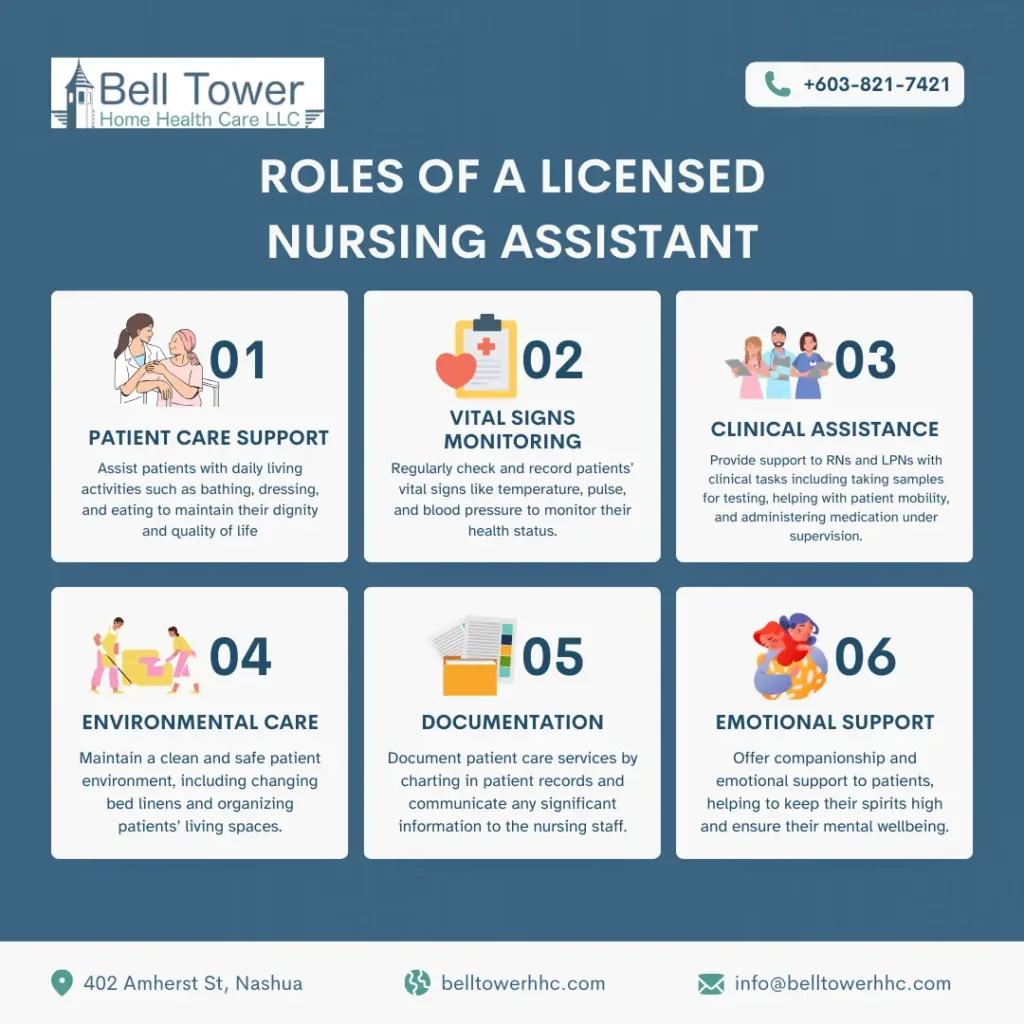As frontline providers of daily care, Licensed Nursing Assistants ensure that patients’ most basic needs are met with empathy and expertise, facilitating a better quality of life for those under their care. Their role is critical in executing the essential tasks that support both patients and nursing staff, making them indispensable in the efficient functioning of healthcare facilities.
The importance of LNAs has grown markedly within the ever-evolving healthcare sector. The Bureau of Labor Statistics (BLS) forecasts a growth rate of about 4% from 2022 to 2023 for nursing assistant positions, including LNAs, a rate much faster than the average for all occupations. This uptick is attributed to the aging population, which necessitates a higher demand for long-term care and support services. In New Hampshire, the demand mirrors national trends, with the state’s healthcare sector seeking to bolster its workforce with qualified LNAs to meet the increasing needs of its aging residents.
As part of our effort to highlight the vital roles within the healthcare industry, we’re launching a new series titled “Healthcare Heroes in the Spotlight.” This series aims to introduce our audience to the many faces of healthcare, starting with Licensed Nursing Assistants (LNAs). Through “Healthcare Heroes in the Spotlight,” we seek to inform, inspire, and acknowledge the significant contributions of healthcare workers.
Becoming a Licensed Nursing Assistant
To become an LNA in New Hampshire, candidates must complete a state-approved training program. These programs are designed to provide the foundational knowledge and hands-on experience necessary for the profession. Typically, an LNA program covers topics such as patient care, basic nursing skills, anatomy, and physiology, and includes both classroom instruction and clinical practice. After completing the educational requirements, which usually range from 4 to 12 weeks, aspiring LNAs must then pass the state’s competency examination to demonstrate their knowledge and skills in nursing assistance.
The certification process is a critical step in becoming an LNA. Upon passing the competency exam, candidates are awarded their LNA certification, making them eligible to work in various healthcare settings. It’s important to note that beyond the technical skills acquired through training and certification, successful LNAs possess strong soft skills. Communication is crucial, as LNAs often serve as a key link between patients and the rest of the healthcare team. Empathy and the ability to understand and share the feelings of others are essential in providing patient-centered care. Additionally, physical stamina is important, as the job can be physically demanding, requiring LNAs to be on their feet for long periods and occasionally assist with lifting or moving patients. These soft skills, combined with the proper education and certification, prepare individuals for a rewarding career as an LNA.

Roles of a Licensed Nursing Assistant
An LNA is a crucial healthcare team member, focusing on patient care and support. Here’s what defines their role:
Certified Professionals:
LNAs are trained and certified to assist patients with their basic living activities. This includes:
- Bathing and dressing
- Feeding
- Assisting with mobility
- Monitoring vital signs
Key Responsibilities:
Beyond aiding with daily activities, LNAs also play a role in:
- Assisting with medical procedures
- Providing patient observation reports to nurses
- Ensuring the comfort and safety of patients
Work Settings:
LNAs find opportunities in diverse environments, each offering unique experiences and challenges:
- Hospitals
- Long-term care facilities
- Rehabilitation centers
- Private homes
Supporting RNs and LPNs:
By taking on routine care tasks, LNAs enable RNs and LPNs to concentrate on complex clinical duties, thereby:
- Enhancing the care team’s efficiency
- Improving patient care quality
- Contributing to a collaborative care environment
The role of an LNA is indispensable in the healthcare system. They provide the foundational support that allows RNs and LPNs to perform at their best, ensuring patients receive comprehensive and compassionate care.

How LNAs Make a Difference in Home Healthcare
Licensed Nursing Assistants (LNAs) play a critical role in home healthcare settings for several reasons:
- Personalized Care: Home healthcare often requires personalized, one-on-one attention that caters to the specific needs of each patient. LNAs provide this level of care, helping patients with daily activities such as bathing, dressing, and eating, which might be challenging due to illness, injury, or age.
- Observation and Communication: LNAs are on the front lines of patient care, which places them in an ideal position to observe changes in a patient’s condition. They can communicate these observations to the rest of the healthcare team, ensuring timely adjustments to care plans. This close monitoring is crucial in preventing complications and promoting quicker recoveries.
- Supporting Independence: One of the primary goals of home health care is to support patients’ independence and quality of life in their own homes. LNAs play a key role in achieving this by assisting patients with tasks they can’t manage alone, thus helping them maintain a sense of normalcy and dignity.
- Emotional Support: Beyond physical care, LNAs provide emotional support and companionship to patients, many of whom may be isolated or dealing with challenging health conditions. This emotional connection can significantly impact patients’ mental health and overall well-being.
- Cost-Effectiveness: By providing care in the patient’s home, LNAs help reduce the need for more expensive healthcare options, such as hospital stays or long-term care facilities. This not only benefits the healthcare system but also provides patients with a more comfortable and familiar healing environment.
- Flexibility and Continuity: LNAs offer a level of flexibility that is unmatched by traditional healthcare settings. They can adapt to the schedules and changing needs of their patients, providing consistent care that also supports the work of RNs, physical therapists, and other healthcare professionals involved in a patient’s care plan.
Job Market for LNAs in New Hampshire
New Hampshire has one of the highest median ages in the United States, with a substantial portion of its population over the age of 65. This demographic shift towards an older population is significant, with projections indicating that by 2030, one-third of New Hampshire’s residents will be over the age of 65. This aging population is more likely to require healthcare services, particularly those that can be provided in the comfort of their own homes. Recent surveys and studies suggest an increasing preference among the elderly for home health care, with as much as 76% of Americans over 50 expressing a desire to remain in their homes as long as possible.
This shift towards home-based care is driving the demand for LNAs, who are vital in providing daily care and support to individuals opting to age in place. In response, New Hampshire’s healthcare policies and initiatives are increasingly focused on expanding access to home and community-based services. State-led initiatives, such as training scholarships for LNAs and programs aimed at enhancing job satisfaction, are not only a testament to the state’s commitment to quality healthcare but also act as an incentive for those considering a career as an LNA. With the growing need for personalized, compassionate care at home, LNAs in New Hampshire are finding themselves at the heart of a rapidly expanding sector of the healthcare industry.

Salary Expectations for LNAs in New Hampshire
In New Hampshire, the career of a Licensed Nursing Assistant (LNA) is not only highly valued for its essential role in healthcare but also offers competitive compensation. The average salary for LNAs varies, with the U.S. Bureau of Labor Statistics citing an average annual wage of $39,050, which translates to about $20 per hour. However, salary reports from ZipRecruiter provides a broader perspective on the earning potential of LNAs in New Hampshire, highlighting that the average annual pay stands at $33,174. Notably, the top earners in the 75th percentile can expect salaries up to $48,139 annually, showcasing the potential for higher earnings with experience and specialization. Furthermore, Indeed reports that the hourly wage for a Nursing Assistant can go as high as $22.86, underlining the lucrative nature of this profession in certain settings or with advanced skills and experience.
These figures underscore the financial viability of pursuing a career as an LNA in New Hampshire. The state not only offers a rewarding professional pathway but also competitive wages that reflect the critical role LNAs play in healthcare. Whether entering the field as a new LNA or seeking advancement through specialization or further education, the financial outlook is promising.
Continued Education and Career Advancement
For Licensed Nursing Assistants (LNAs) in New Hampshire, the pathway to career advancement and professional growth is rich with opportunities. Many LNAs choose to further their careers by becoming Registered Nurses (RNs) or Licensed Practical Nurses (LPNs), positions that offer greater responsibilities along with higher compensation. This transition typically requires additional education, such as completing an accredited nursing program and passing the relevant licensure exams. New Hampshire provides a supportive environment for such advancement, with numerous community colleges and universities offering nursing programs designed to accommodate working professionals through evening and weekend classes, online coursework, and accelerated options.
Moreover, LNAs have the opportunity to specialize in areas of care that are in high demand, such as geriatrics, pediatrics, or home health care, through continuing education courses and certifications. The state offers various resources, including scholarships and grants specifically aimed at healthcare workers looking to advance their skills and qualifications. These continuing education efforts are not only beneficial for career advancement but also ensure that LNAs can continue to provide the highest quality of care to their patients, thereby enriching their professional journey and contributing significantly to the healthcare system in New Hampshire.
Your Career Path with Bell Tower Home Health Care
Licensed Nursing Assistants (LNAs) are indispensable to New Hampshire’s healthcare system, providing essential care that supports the state’s aging population and meets the growing demand for personalized, home-based services. Their work not only enhances patient outcomes but also strengthens the healthcare workforce, making their role crucial in the evolving landscape of healthcare.
If you’re inspired to make a difference and pursue a rewarding career as an LNA, now is the perfect time to take the first step. Bell Tower Home Health Care is actively seeking compassionate LNAs to join our team, especially in Nashua, Manchester, and Hooksett. Contact us today to learn more about the current job openings and how you can become part of our dedicated team of healthcare professionals.




